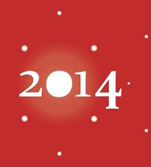Colour me beautiful – Carotenoids
What are they?
Carotenoids are natural pigments that are found in plants and some bacteria – generally we animals don't produce them so have to get our quota of carotenoids from eating the producers! There are over 600 types of carotenoids. In humans, beta carotene is useful for the production of retinal.

Some examples of the colours of carotenoids. From left to right these are astaxanthin, canthaxanthin, zeaxanthin and beta-carotene.
To gain further insight into the conformation colour relationships in marine crustacea [1], research led by Dr Madeleine Helliwell set about crystallising and determining the crystal structures of free carotenoids [2,3]. From these X-ray crystal structures variations were seen in the free carotenoid C5-C6-C7-C8 torsion angle for zeaxanthin (-75º) and the trans-astaxanthin ester (178º), and differences in colours of the crystalline solids arose from the variation of the degree of conjugation into the end rings and thereby their colours.

The astaxanthin molecule, a type of carotenoid found in marine crustacea.
What do they look like?
Giuditta Bartalucci [3] synthesised the diester of astaxanthin and then grew crystals where she found both s-cis and s-trans configurations! There were colour differences between them.

The different colours of astaxanthin depending on the conformation of the molecule.
Where did the structure come from?
In summary the ensemble of crystal structures in refs [2,3] allowed tests of the effect of carotenoid conformation, as well as their crystal-packing arrangements, and to some extent the effect of solvation, on the colours of the crystals. However all the samples studied in [2,3] were red in hue and not the blue colour of beta crustacyanin [1].
[1] M. Cianci, P. J. Rizkallah, A. Olczak, J. Raftery, N. E. Chayen, P. F. Zagalsky and J. R. Helliwell. "The molecular basis of the coloration mechanism in lobster shell: β-crustacyanin at 3.2 Å resolution" (2002). PNAS USA, 99, 9795-9800.
[2] G. Bartalucci, J. Coppin, S. Fisher, G. Hall, J. R. Helliwell, M. Helliwell and S. Liaaen-Jensen. "Unravelling the Chemical Basis of The Bathochromic Shift in the Lobster Carapace; New Crystal Structures of Unbound Astaxanthin, Canthaxanthin and Zeaxanthin" (2007). Acta Cryst. B63, 328-337.
[3] G. Bartalucci, S. Fisher, J. R. Helliwell, M. Helliwell1, S. Liaaen-Jensen, J. E. Warren and J. Wilkinson. "X-ray crystal structures of diacetates of 6-s-cis and 6-s-trans astaxanthin and of 7,8-didehydroastaxanthin and 7,8,7’,8’-tetradehydroastaxanthin: comparison with free and protein bound astaxanthins" (2009). Acta Cryst. B65, 238-247.






